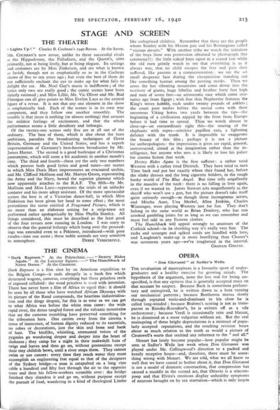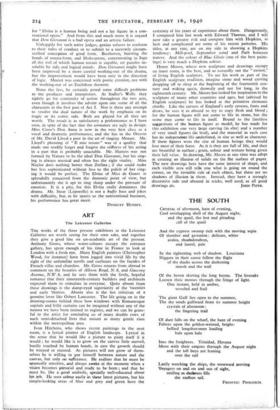OPERA
" Don Giovanni " at Sadler's Wells THE revaluation of masterpieces is a favourite sport of under- graduates and a healthy exercise for growing minds. The hypothesis of the argument, none the less real for being un- specified, is that any opinion that is generally accepted must on that account be suspect. Because Bach is sometimes perfunc- tory and uninspired, he is written down as a bore turning out mechanical patterns ; because Beethoven moves slowly through repeated tonic-and-dominant to his dose he is called long-winded ; because Brahms's scoring is not as trans- parent as Rimsky-Korsakov's, he is written off as a vile orchestrator ; because Verdi is occasionally trite and blatant, he is dismissed as a mere vulgarian without art. But the real mainspring of these bright depreciations is a mistrust of popu- larly accepted reputations, and the resulting revision bears about as much relation to the truth as would a picture of Cromwell's warts that omitted any reference to the " and all."
Mozart has lately become popular—how popular might be seen at Sadler's Wells last week when Don Giovanni was played under Mr. Collingwood's direction to a packed and keenly receptive house—and, therefore, there must be some- thing wrong with Mozart. We are told, what we all knew so well that we have ceased to bother about it, that Don Giovanni is not a model of dramatic construction, that compression has caused a muddle in the second act, that Ottavio is a nincom- poop and that Elvira's emotions display unhealthy symptoms of neurosis brought on by sex starvation—which is only jargon for " Elvira is a human being and not a lay figure in a con- ventional opera." And from this and much more it is argued that Don Giovanni is a bad opera and an artistic failure.
Unhappily for such naive judges, genius refuses to conform to their rules of conduct or to submit to a narrowly circum- scribed conception of good form. Beethoven, bursting the bonds of sonata-form, and Shakespeare, concentrating in Iago all the evil of which human nature is capable, set puzzles in- soluble by tidy, and logical minds. Don Giovanni might have been improved by a more careful working-out of the drama, but the improvement would have been only in the direction of logic. Mozart was concerned with poetic creation, not with the working-out of an Euclidean theorem.
None the less, he certainly posed some difficult problems to the producer and interpreters. At Sadler's Wells they rightly go for continuity of action throughout the two acts, even though it involves the advent upon one scene of all the characters in the first part of Act I. Nor is there any attempt to resolve the dual nature of the work by emphasis on its tragic or its comic side. Both are played for all they are worth. The result is as satisfactory a performance as I have seen, in spite of the fact that the costumes are ugly in design. Miss Cross's Don Anna is now in the very first class as a vocal and dramatic performance, and she has in the Octavio of Mr. David Lloyd a peer in the art of singing Mozart. Mr. Lloyd's phrasing of " Il mio tesoro " was of a quality that made one readily forget and forgive the stiffness of his acting in a part that is probably unactable. Mr. Matters was not formed by Nature to be the ideal Don Giovanni, but his sing- ing is always musical and often has the right vitality. Miss Naylor does nothing better than Zerlina ; if she could make her less sophisticated without loss to the polish of her sing- ing it would be perfect. The Elvira of Miss de Gunst is splendidly conceived from the dramatic point of view, but unfortunately she is apt to sing sharp under the pressure of emotion. It is a pity, for this Elvira really dominates the drama. Mr. Stear (Leporello) is not a buffo bass and jokes with difficulty, but, as he spares us the conventional business, his performance has great merit.
DYNEI EY HUSSEY.







































 Previous page
Previous page